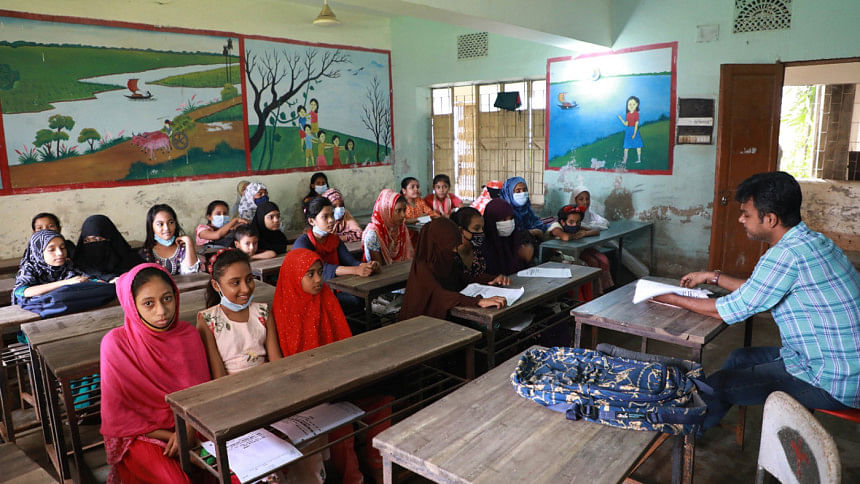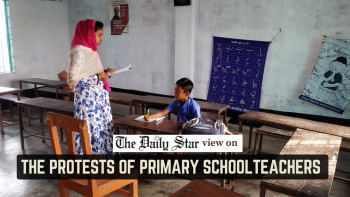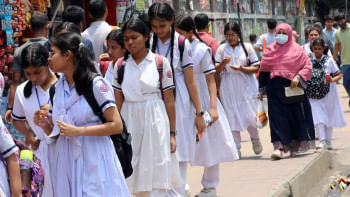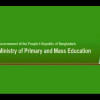Primary teachers’ strike: Is reform stumbling?

Assistant teachers at government primary schools across Bangladesh began an indefinite work abstention from Sunday, demanding that their entry-level pay be at the 11th grade of the national pay scale. Is the government's reform initiative to settle many long-standing problems in primary education unravelling?
On February 10, a government-appointed consultation committee presented a set of recommendations for reform and development in primary and non-formal education to the chief adviser, who said the committee's report deserved serious consideration and early action. A key recommendation was about teachers' and field education workers' status and professional development. It proposed a career path for teachers, shifting from the present pattern of being recruited as assistant teachers, a majority of whom retire from the same position without any career progression.
The proposal was to make "teacher" the entry-level post with salary at 12th grade of the pay scale. They would then become "senior teacher" at salary grade 11 after serving a probationary time. Assistant headteachers and headteachers would be recruited exclusively from serving teachers and would have the chance to be recruited into supervision and management posts. In addition, recommendations were made about easing promotion, transfer, and continuous professional development in response to various complaints.
Importantly, the committee considered the recommended actions as interim measures within the present structure. It proposed that in the longer term, work should be urgently undertaken to provide all schoolteachers (both primary and secondary) a higher status, recognition, and remunerations.
The committee's main concern has been improving children's learning and well-being. It looked upon teachers as the pivot of change, and thus teachers' working conditions and well-being had to be improved. The reforms included over a hundred urgent, medium and long-term actions critical to children's learning outcomes. Some of the recommendations that focus on foundational skills, one-shift schools, remedial learning, student and school assessment, reducing the families' economic burden, preventing corruption and mismanagement, and piloting decentralisation of planning and management are detailed here.
Primary education activities and objectives must focus on building children's foundational skills in Bangla reading and writing and basic arithmetic. The learning content, teaching time, teacher preparation, and assessment of students should be organised around the objective of foundational learning outcomes. To ensure enough learning time, all schools should have only one shift, with enough teachers and classrooms, through a high-priority time-bound plan.
Remedial learning should be arranged for the section of students who remain behind others in coping with class lessons. Apart from classroom care, extra help should be offered to these students beyond class hours, planned and organised by each school, employing para-teachers and cooperating with local education NGOs as needed. Budgets should be allocated for this purpose.
Continuous classroom assessments and annual assessments of students are needed along with assessments of a school's performance. Methods and tools should be developed and disseminated online; teachers should be oriented and supported. Applying criteria, each school, along with the upazila education office, can assess itself, marking itself as green, yellow or red (good, problematic or bad, respectively), and plan to reach or maintain the green status.
Mid-day meals and essential learning supplies (paper, pen, schoolbag) should be provided to all students, starting with the country's poorest areas. Increased and targeted cash support should be considered instead of the general stipend at present. A hotline for complaints from citizens or education personnel should be set up along with a system to attend adequately to complaints and periodically report to the public about actions taken and analysis of trends.
Recognising the complexity of the problem, a pilot project of upazila-based primary education planning and management has been proposed in 20 upazilas under 10 districts. This can be a flagship activity under the fifth round of Primary Education Development Program (PEDP5). The committee saw PEDP5, now expected to begin from 2026, as an opportunity to incorporate the report's recommendations and become an effective vehicle for a coordinated and integrated approach for primary education development.
The committee foresaw implementation challenges and included suggestions regarding the "process of implementing the reforms, financing and the next steps." Five issues were identified: i) informing the public about the reform proposals and encouraging a dialogue about these; ii) the need for the government and ministry to take decisions transparently and with stakeholder consultation about recommendations; iii) determining steps for implementation of early and medium-term actions; iv) urgent consideration of long-term and relevant matters related to the total education system; and v) financing and budget allocations for reforms (especially, in the upcoming financial year).
Four months since the submission of the committee's report, government actions, as much as are publicly known, have been fragmented, partial, uncoordinated, slow, and few. We are not aware of a mechanism for an overall review and consideration of the report as well as measures taken along the lines mentioned above. Media reports about some sporadic actions do not inspire confidence. Cases in point: a unit in the Ministry of Primary and Mass Education has categorised and notified some schools as "red," "yellow" or "green" (turns out very few are "green"). Developing criteria for assessment and engaging schools in a self-assessment process have obviously not happened. Circulars have been sent to some upazilas that schools must not organise any out-of-class hours coaching or tutoring of students, apparently for the safety of female students. This also prevented schools from charging parents any payment. Obviously, well-considered policy guidance for remedial lessons in schools and adapting these to local circumstances are needed but not ad hoc and uncoordinated actions. Besides, contrary to reform ideas, it is reported that the discontinued scholarship examinations at the end of Class 5 is to be re-introduced.
Teachers' grade and salary level are clearly a sensitive matter. Media reports about a new salary level proposed by the primary education directorate to the public administration ministry, without explaining the context and other ancillary proposals regarding teachers' grades and promotions, have generated resentment and led to protests by the teachers. The committee members voluntarily offered to discuss with the concerned planners the intricacies of incorporating the proposed recommendations into the PEDP5 design, but so far there has been no interaction, as far as we can tell. Unless there is a change in the way decisions are made and implemented, the reform results will not be achieved.
It appears that top officials of the government lack the enthusiasm for transformative change or are unable to comprehend the significance of the changes proposed. So far, we have seen only partial, fragmented, uncoordinated and slow steps, which are creating a negative momentum.
Dr Manzoor Ahmed is professor emeritus at BRAC University, chair of Bangladesh ECD Network (BEN), and adviser to the Campaign for Popular Education (CAMPE).
Views expressed in this article are the author's own.
Follow The Daily Star Opinion on Facebook for the latest opinions, commentaries and analyses by experts and professionals. To contribute your article or letter to The Daily Star Opinion, see our guidelines for submission.

 For all latest news, follow The Daily Star's Google News channel.
For all latest news, follow The Daily Star's Google News channel. 








Comments